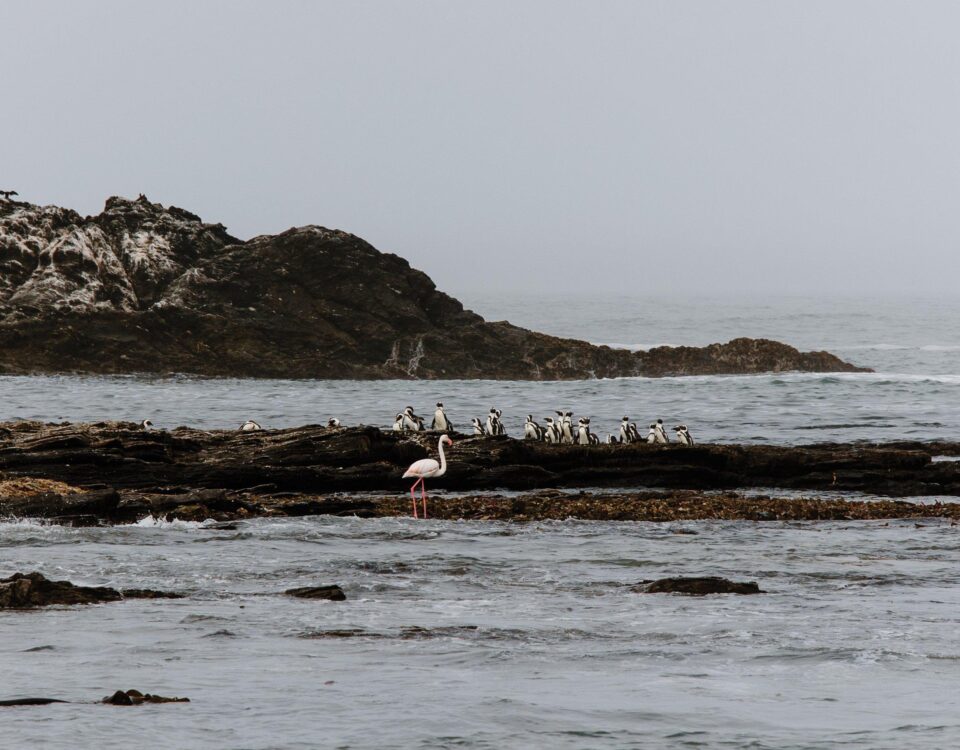
Dünenblick Self-Catering Apartments – Swakopmund
July 19, 2012The Maiteko Cultural Group – Promoting our diverse cultural heritage
July 19, 2012by Ron Swilling
A hundred and eighty kilometres north of Opuwo, the Kunene River plunges 35 metres into the gorge below. A few baobab trees cling precariously to the rocky sides below the Epupa Falls as numerous torrents of water rumble and tumble down the rocks. Flashes of rainbows add magic to grandeur, and wonder to the watery realms.
On the route to Epupa the traveller catches glimpses of rural traditional life in Himba settlements, their round huts plastered with mud and dung. A few baobabs stand as sentinels, standing out from the mopane woodland. As you near the Kunene River and crest the last hill, the dazzling makalani forest on the riverbank becomes visible.
Rich in African character, Epupa Falls is small in comparison to the vast Victoria Falls where the Zambezi crashes down majestically. Yet the simple and peaceful atmosphere and the relaxed Epupa Falls Campsite set in the makalani forest along the riverbank makes this northerly point a highlight of the area.
Positioned a short walk from the falls (where there are no tourist facilities), the sites under the makalani palms have barbecue areas, sinks and taps, and a first-class setting. The water rushes toward the falls and a fine mist sprays into the air. Grass-walled, open-roofed ablution blocks have flush toilets and hot water heated by ‘donkey’ wood-burners. When you arrive at the campsite, the campers sit reading or lying in the shade, seemingly more relaxed than at other sites. This may be due to the lack of facilities at Epupa and the campsite; the tranquil, exquisite setting; and the rumbling lullaby of the water.
Guided walks are offered to the falls, along the banks and to a nearby Himba settlement. With the rocks nearby the riverbank providing good washing pools, a few people are always bathing or doing laundry, the multicoloured string of clothes hanging in the palms adding to the African atmosphere. A small craft centre sells Himba jewellery and the intriguing Himba character of this area is felt as in Opuwo, with Himba people walking around in their traditional attire, the women in cow-skin wraps shining with red ochre, the men with fabric wraps, sticks and unique hairstyles.
The amount of water in the falls is dependent on the hydroelectric plant in Ruacana 135 kilometres upstream. With the dam usually closed on the weekends, the water runs strongly again by Tuesday. The falls can change in a day from a relatively small trickle to a torrent of waterfalls cascading over rocks. Both periods are beautiful, but it is the thundering falls with its baobabs that makes it so awe-inspiring. Regardless of the amount of water, the campsite music consists of rushing water, and the scenery is superb.
Come prepared – the last supermarkets and fuel stations are in Opuwo. Bring a supply of drinking water, as the water is pumped directly from the river. A small camp shop sells cold drinks, beer and washing soap. Refrain from the temptation to swim, as the Kunene is rife with crocodiles.
 This article was made possible by Cymot Namibia
This article was made possible by Cymot Namibia
This article appeared in the April/May ‘09 edition of Travel News Namibia.



